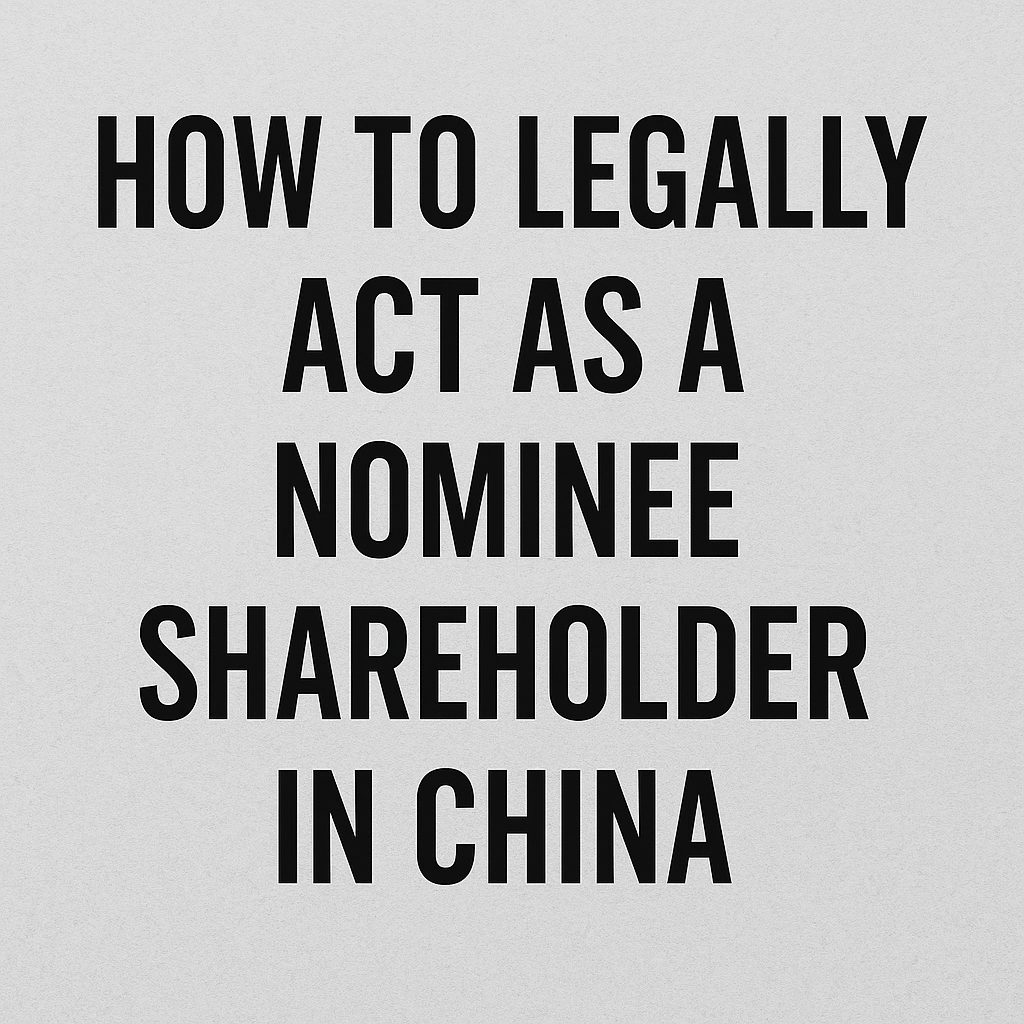Contents
Introduction:
Becoming a nominee shareholder in China is a commonly used mechanism by foreign individuals or entities seeking to invest in Chinese companies while navigating the country’s regulatory restrictions. As China tightens foreign investment controls through its Foreign Investment Law, Company Law, and Negative List for Market Access, the legality and enforceability of nominee shareholder arrangements have drawn growing scrutiny. This article analyzes how foreigners can lawfully participate in Chinese companies through nominee structures, the legal boundaries under current regulations, and best practices to reduce risk and ensure compliance.
I. Legal Framework for Becoming a Nominee Shareholder in China
China does not prohibit foreigners from being shareholders in local companies outright. However, when a foreign investor uses a nominee shareholder to hold equity on their behalf, the arrangement must be evaluated against the country’s legal framework.
The Company Law of the People’s Republic of China does not restrict shareholder nationality. Meanwhile, the Foreign Investment Law enforces a system of pre-establishment national treatment and a negative list mechanism. If the industry in question appears on the Negative List for Foreign Investment Access, foreign investment may be either restricted or outright prohibited.
In such cases, acting as a nominee shareholder in China may be legally risky or even invalid. Conversely, if the target industry is open to foreign participation, nominee structures—when properly documented—may be permitted.
II. Enforceability of Equity Holding Agreements as a Nominee Shareholder in China
A nominee shareholder arrangement typically involves an agreement where the actual investor entrusts another party (the nominee) to hold shares in a Chinese company. These arrangements are also referred to as equity holding or proxy shareholder agreements.
Chinese courts generally assess their enforceability on a case-by-case basis. Agreements that serve lawful purposes, reflect genuine intent, and do not violate mandatory provisions—such as those in the Foreign Investment Law—are more likely to be upheld. However, if the agreement attempts to bypass foreign ownership restrictions in a prohibited industry, it may be declared invalid.
To protect the rights of the actual investor acting through a nominee shareholder in China, the agreement must clearly outline profit distribution, voting rights, dispute resolution mechanisms, and ownership recognition.
III. Notarization and Legalization in Nominee Shareholders in China Agreements
When foreign investors enter into nominee shareholder arrangements, any related legal documents must be properly authenticated for use in China.
This usually includes:
-
Notarization by a public notary in the investor’s country of residence;
-
Legalization by the Chinese embassy or consulate;
-
Or, if applicable, apostille certification under the Hague Convention.
Chinese authorities also require certified translations of any non-Chinese documents. Notarized and legalized agreements bolster the credibility of the nominee arrangement and enhance the likelihood of judicial recognition should a dispute arise.
This step is especially important for a nominee shareholder in China, since it substantiates the validity of beneficial ownership and contractual obligations.
IV. Foreign Investment Restrictions and the Negative List for a Nominee Shareholder in China
The Negative List for Foreign Investment Access, jointly issued by the National Development and Reform Commission (NDRC) and the Ministry of Commerce (MOFCOM), outlines sectors where foreign investors are restricted or prohibited.
Common restrictions include:
-
Sectors where Chinese parties must retain controlling interest;
-
Full prohibition on foreign ownership in sensitive industries (e.g., media, defense, rare earth minerals).
If a foreign investor attempts to engage in a restricted industry through a nominee shareholder in China, this is often regarded by regulators as a circumvention attempt. If detected, authorities may:
-
Invalidate the investment;
-
Order withdrawal from the business;
-
Impose penalties on both the actual investor and nominee.
Thus, before establishing a nominee structure, foreign investors must verify that the target industry is not covered by the negative list.
V. Legal Risk Management for Acting as a Nominee Shareholder in China
While nominee structures can offer flexibility, they also carry significant legal, financial, and reputational risks. Recommended best practices include:
-
Draft Clear Nominee Agreements
Define all aspects of the arrangement: ownership percentages, obligations, liability, dispute resolution, and exit mechanisms. -
Avoid Regulatory Evasion
Do not use a nominee shareholder in China to bypass foreign investment approval, capital contribution obligations, or foreign exchange controls. Courts may view such actions as intentional evasion. -
Periodic Legal Review
As Chinese laws evolve, have the nominee arrangement reviewed by qualified legal counsel to ensure continuing compliance. -
Consider Long-Term Transition
If regulatory conditions permit, consider transferring shares from the nominee to the actual foreign investor when legal channels allow it.
Conclusion
The use of a nominee shareholder in China remains a legal grey zone—permissible in some situations, but highly risky in others. Foreign investors must navigate these arrangements with caution and expert legal guidance.
By respecting the Foreign Investment Law, avoiding industries listed in the Negative List, and executing properly notarized and transparent nominee agreements, it is possible for a foreigner to become a shareholder in a Chinese company lawfully.
Still, the nominee model should not be seen as a substitute for direct investment through formal registration channels. When handled properly, however, it can serve as a transitional or strategic tool for foreign participation in China’s dynamic but tightly regulated economy.



